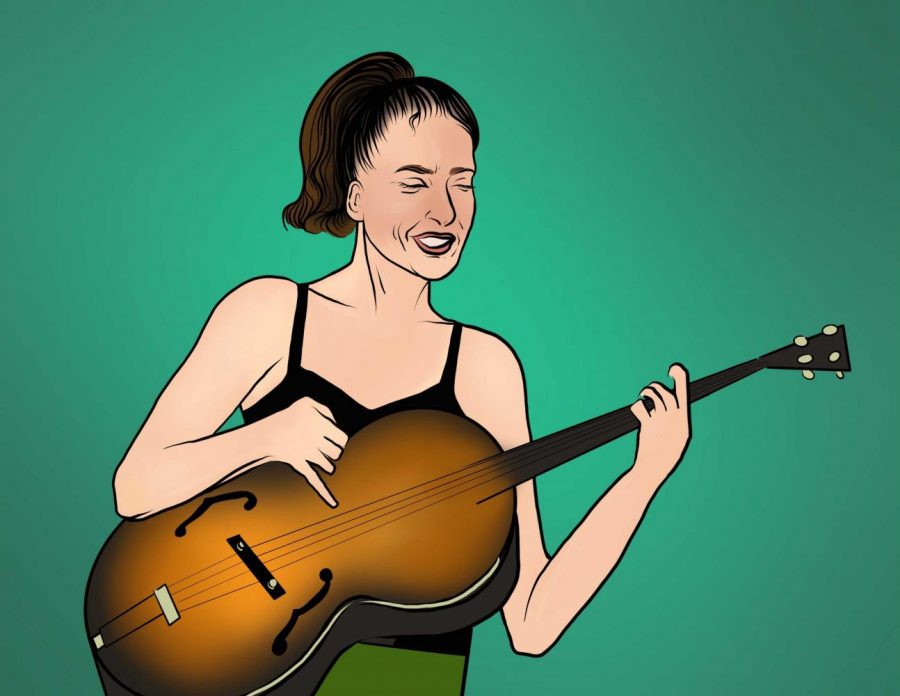Ani DiFranco: singer, songwriter, poet, activist. No celebration of Women’s History Month would be complete without a nod to New York’s own “Little Folksinger.” As a young adult, I connected with her coming-of-age anthems and unapologetic feminist views. DiFranco’s deeply personal and politically charged music has established her as an artist worth revering.
Raised in Buffalo, New York, DiFranco started playing guitar at the age of 9. Ten years later, she moved to New York City, and at 19, she started her own label, Righteous Babe Records. From the beginning, she defiantly rejected offers from record companies who would court her talents for years to come.
DiFranco released her first, self-titled album in 1990 while studying poetry at The New School. Her skill as a writer came through in her sophisticated lyrics and inclusion of spoken word and beat poetry. Her songs drew from her own life and told stories of queer relationships (“Little Plastic Castle”) and a woman’s right to choose (“Play God”). She was unafraid to discuss topics avoided by other artists, such as an abortion she had at 18 (“Lost Woman Song”) or an affair with a married woman (“Shameless”). When I first heard “Two Little Girls,” a heartbreaking song about witnessing a friend’s overdose, I was captivated by the line, “Love is a piano dropped from a four-story window/And you were in the wrong place at the wrong time.”
DiFranco found a home in the coffee shops and bars of Greenwich Village, where she earned her place in the lineage of New York’s bohemian artists. Seated in the corner of a room, she cut through the noise using aggressive staccato fingerpicking and a wide range of dynamics. For amplification, DiFranco glued on plastic fingernails and secured them with electrical tape to give herself five guitar picks. Her piercing vocals and pounding rhythms were jarring enough to grab the attention of the loudest drunk in the bar.
Some of DiFranco’s most iconic records were released in the mid-90’s, including “32 Flavors” and the unrequited love song “Untouchable Face.” “Not a Pretty Girl” delivered snarling rock with an angelic melody and lyrics that responded to her critics, “Every time I say something they find hard to hear/They chalk it up to my anger/And never to their own fear.” I wish I could have delivered this record to my 10-year-old self and any other young person searching for their voice.
DiFranco’s style of music developed out of the folk tradition, using only an acoustic guitar. Though she experimented with instrumentation and styles from blues to jazz in her later albums, DiFranco never rejected her roots, saying, “I use the word folk in reference to punk music and to rap music. It’s an attitude, it’s an awareness of one’s heritage, and it’s a community. It’s subcorporate music that gives voice to different communities and their struggle against authority.”
By the end of the decade, the mainstream music industry began to take notice, and DiFranco received recognitions that included Grammy nominations for best female rock vocalist in 1997, 1998 and 2000.
Throughout her career, DiFranco has consistently been on the front lines of political activism. She performed at the 2004 March for Women’s Lives in Washington, D.C., endorsed Green party candidate Ralph Nader and invited anti-war Democrat Dennis Kucinich to speak at her concerts.
Released prior to the 2020 elections, DiFranco’s video for “Do or Die” follows her around her current home in New Orleans as she hangs signs reading “Vote Them Out” to encourage voter turnout.
“Revolutionary Love” shows that her creative well has yet to run dry. Released in January, her 22nd studio album is deeply contemplative and offers a message of hope during a time of stark political division. The title track serves as a reminder to cultivate inner peace in the midst of social activism.
“It’s basically about showing up to the hard labor of good change, of truth and justice, with love in your heart,” DiFranco said in an interview with CBS news. Reflecting on her 30-year career, she added, “I’ve always come from the place of revolutionary love. I love my country and that’s why I fight for it in my way … It is all out of love.”
DiFranco has become a matriarch of folk activism, and her calming voice of reason is something we all need to hear.
“I wanted to have these moments where, after we engage with all the insanity and strife, we step back and shake off the anxiety and the fear,” DiFranco said about her new album. “We all need that quiet space to reconnect with ourselves and our hope.”
Email Holly Seefeldt at [email protected].























































































































































